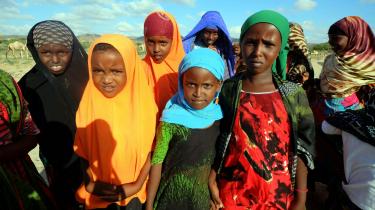
This opinion piece was authored by Baroness Liz Sugg, UK’s Special Envoy for Girls’ Education, Ruth Kagia, Senior Advisor to President Kenyatta of Kenya, and Alice Albright, CEO of GPE. It was initially published in The Telegraph in the UK.
We must stop a lost generation from never returning to school
Urgent global action and investment is now desperately needed to help us achieve every girl’s right to 12 years of quality education
The world is confronting an unprecedented education crisis. At the height of school closures caused by the coronavirus pandemic, more than 1.3 billion children were forced out of their classrooms. As many as 16 million children in the world’s most vulnerable countries may never return to school, forced to take on work to help their families survive the brutal economic impacts of this deadly disease.
Even before the pandemic, the world has been struggling to ensure that all children receive a quality education. Children’s ability is not determined by borders, but opportunity is sadly sometimes limited by them. Before coronavirus struck, nine in 10 school children in low income countries were unable to read a story by age 10.
In too many countries, girls are denied opportunities to learn while their brothers are sent to school. Many children in rural or remote areas don’t have schools to go to at all, or their families can’t afford the time and money to send them there. Children with disabilities are often excluded from school altogether. When girls do not attend school, they are more vulnerable to violence and sexual abuse.
Missing out on education does long term damage to individuals, communities and nations, with girls particularly at risk. As a result of this crisis, a generation of girls who should be among the ranks of future entrepreneurs, scientists, engineers, and world leaders could instead be left only dreaming of what they might otherwise have become. The UK, as a force for good in the world, and champion of girls’ education will lead the charge with Kenya to prevent this.
The benefits of schooling are transformative and span generations. By educating girls today we can genuinely change the world of tomorrow. Every additional year a girl stays in secondary school, she can increase her future earnings by up to 20 per cent.
Widening access to education for girls improves their chances of finding a job, escaping child marriage and of choosing how many children to have. Education makes families more prosperous and improves the health of the next generation of children.
Ending grinding poverty, tackling the most pervasive effects of climate change and finding lasting peace and security in some of the most fragile communities will only happen if we mobilise the talent of whole populations by getting girls into school and learning.
Urgent global action and international investment is now desperately needed to help us achieve every girl’s right to 12 years of quality education, build back better from coronavirus and stop a lost generation of girls never returning to school.
That’s why the Global Partnership for Education (GPE) is so important. GPE has the vision, the ability and the strength to get things done. It is an investment that really does transform lives through the power of education. Since its creation in 2002, GPE has already contributed to getting 160 million more children in school and doubling girls’ enrollment in the countries they work in.
In 2021, the year of the UK’s G7 presidency, the UK and Kenya will co-host a landmark global education summit. The summit will push for concrete action to get children into school and raise vital funding for the GPE. Prime Minister Boris Johnson and President Uhuru Kenyatta have been clear that girls’ education is a priority for our countries.
Already UK aid has helped 15.8 million children – including more than eight million girls – get a decent education, and Kenya has broken down systematic barriers to achieve universal primary education for all girls and boys. We are stepping up our efforts and we need other countries to join us.
Over the next five years, GPE needs at least US$5 billion to transform education systems in up to 87 developing countries. This will give 175 million children the opportunity to learn.
Achieving this will be a challenge for the world, but let us not forget that behind each of these statistics is a child, a girl or boy who looks to education as the path to a better future.
Through the GPE, we will direct investment and action to where it is needed most. Together governments, businesses and individuals can and must invest in children’s futures – girls deserve an education and we cannot let them down. Our ask is simple: Raise your hands. Fund education.
We can only achieve the future we want by investing in the generation that will build it.
